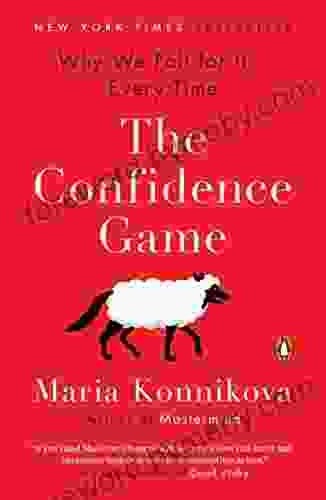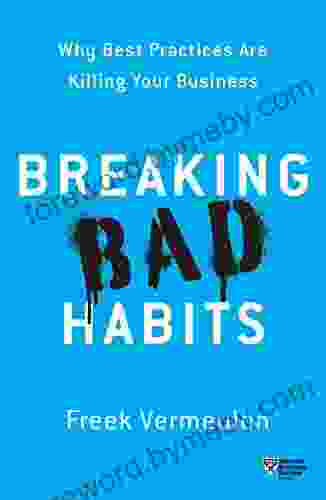Why We Fall For It Every Time: A Deep Dive into the Psychology of Deception


4.3 out of 5
| Language | : | English |
| File size | : | 1141 KB |
| Text-to-Speech | : | Enabled |
| Screen Reader | : | Supported |
| Enhanced typesetting | : | Enabled |
| X-Ray | : | Enabled |
| Word Wise | : | Enabled |
| Print length | : | 343 pages |
In an era of fake news, scams, and endless misinformation, it seems like we're falling for deception more than ever before. But why do we do it? What is it about human psychology that makes us so susceptible to being fooled?
In this article, we'll explore the fascinating psychology behind deception. We'll learn about the cognitive biases that make us vulnerable to manipulation, and we'll discover how scammers and con artists use these biases to their advantage.
We'll also discuss the importance of critical thinking and skepticism, and we'll provide tips on how to protect yourself from being deceived.
The Cognitive Biases That Make Us Vulnerable to Deception
There are a number of cognitive biases that make us more likely to fall for deception. These biases are mental shortcuts that our brains use to make decisions quickly and efficiently. However, these shortcuts can also lead us to make mistakes.
Here are some of the most common cognitive biases that make us vulnerable to deception:
- Confirmation bias: This bias leads us to seek out information that confirms our existing beliefs, while ignoring information that contradicts them. This can make us more likely to believe false or misleading information that supports our worldview.
- Framing effect: This bias refers to the way that the way information is presented can influence our decisions. For example, we may be more likely to buy a product if it is presented as a "limited-time offer" or a "special deal."
- Illusion of truth effect: This bias refers to the tendency to believe information that we hear or see repeated multiple times, even if it is false.
- Authority bias: This bias refers to the tendency to trust and obey authority figures, even when they are wrong.
- Groupthink: This bias refers to the tendency to conform to the opinions of the group, even if we don't agree with them.
These are just a few of the many cognitive biases that can make us vulnerable to deception. By being aware of these biases, we can be more mindful of how they might influence our decisions.
How Scammers and Con Artists Use Cognitive Biases to Their Advantage
Scammers and con artists are well aware of the cognitive biases that make us vulnerable to deception. They use these biases to their advantage to manipulate us into giving them our money, our personal information, or our trust.
Here are some of the ways that scammers and con artists use cognitive biases to their advantage:
- They use confirmation bias to get us to believe their lies. They tell us what we want to hear, and they ignore or discredit any information that contradicts their claims.
- They use framing effects to make their offers seem more attractive. They use persuasive language and create a sense of urgency to get us to act quickly, without thinking critically about their offer.
- They use the illusion of truth effect to get us to believe their false claims. They repeat their lies multiple times, and they may use testimonials or other forms of social proof to make their claims seem more credible.
- They use authority bias to get us to trust them. They may pretend to be an expert in a particular field, or they may use titles or affiliations to make themselves seem more credible.
- They use groupthink to get us to conform to their opinions. They may use peer pressure or social media to create a sense of urgency and make us feel like we're missing out if we don't go along with their crowd.
These are just a few of the many ways that scammers and con artists use cognitive biases to their advantage. By being aware of these tactics, we can be more mindful of how they might influence our decisions.
The Importance of Critical Thinking and Skepticism
Critical thinking and skepticism are two important tools that we can use to protect ourselves from deception. Critical thinking involves the ability to think clearly and rationally about information, while skepticism involves questioning and evaluating information before we believe it.
By using critical thinking and skepticism, we can avoid falling for the tricks and traps that scammers and con artists use. Here are some tips for developing critical thinking and skepticism:
- Be aware of your own cognitive biases. This is the first step to avoiding being deceived by them.
- Question your assumptions. Don't just accept information at face value. Ask yourself why you believe something, and what evidence you have to support your belief.
- Seek out diverse perspectives. Don't just listen to information that confirms your existing beliefs. Seek out information from a variety of sources, including sources that disagree with you.
- Be skeptical of claims that seem too good to be true. If something sounds too good to be true, it probably is.
By following these tips, you can develop critical thinking and skepticism skills that will help you to avoid being deceived.
Falling for deception is a common experience, but it doesn't have to be. By understanding the psychology behind deception, we can be more mindful of how we make decisions and how scammers and con artists might try to manipulate us. By using critical thinking and skepticism, we can protect ourselves from being deceived and make better decisions about the information we consume and the people we trust.
4.3 out of 5
| Language | : | English |
| File size | : | 1141 KB |
| Text-to-Speech | : | Enabled |
| Screen Reader | : | Supported |
| Enhanced typesetting | : | Enabled |
| X-Ray | : | Enabled |
| Word Wise | : | Enabled |
| Print length | : | 343 pages |
Do you want to contribute by writing guest posts on this blog?
Please contact us and send us a resume of previous articles that you have written.
 Book
Book Novel
Novel Page
Page Chapter
Chapter Text
Text Story
Story Genre
Genre Reader
Reader Library
Library Paperback
Paperback E-book
E-book Magazine
Magazine Newspaper
Newspaper Paragraph
Paragraph Sentence
Sentence Bookmark
Bookmark Shelf
Shelf Glossary
Glossary Bibliography
Bibliography Foreword
Foreword Preface
Preface Synopsis
Synopsis Annotation
Annotation Footnote
Footnote Manuscript
Manuscript Scroll
Scroll Codex
Codex Tome
Tome Bestseller
Bestseller Classics
Classics Library card
Library card Narrative
Narrative Biography
Biography Autobiography
Autobiography Memoir
Memoir Reference
Reference Encyclopedia
Encyclopedia Print Replica Kindle Edition
Print Replica Kindle Edition L M Roth
L M Roth Ernest Harsch
Ernest Harsch Ferrett Steinmetz
Ferrett Steinmetz Ettore Accenti
Ettore Accenti R A Mejia
R A Mejia Sarah Maclean
Sarah Maclean Fern Chan
Fern Chan Floyd Stokes
Floyd Stokes Erik Olin Wright
Erik Olin Wright Kevin Griffith
Kevin Griffith Eric Stice
Eric Stice Erich Rautenbach
Erich Rautenbach Lorenzo Cohen
Lorenzo Cohen Sebastian O Kelly
Sebastian O Kelly Freeman Publications
Freeman Publications Frederick Courteney Selous
Frederick Courteney Selous Izaak Walton
Izaak Walton Fiona Tinker
Fiona Tinker Inc The Staff Of Entrepreneur Media
Inc The Staff Of Entrepreneur Media
Light bulbAdvertise smarter! Our strategic ad space ensures maximum exposure. Reserve your spot today!

 Ashton ReedThe Ultimate Sports Book: Unveiling the Winner of The Telegraph Sports Book...
Ashton ReedThe Ultimate Sports Book: Unveiling the Winner of The Telegraph Sports Book...
 Fyodor DostoevskyAn Illustrated Companion For Moms To Be: Nurture Your Growing Baby and...
Fyodor DostoevskyAn Illustrated Companion For Moms To Be: Nurture Your Growing Baby and... Donald WardFollow ·8.6k
Donald WardFollow ·8.6k Ralph Waldo EmersonFollow ·15.3k
Ralph Waldo EmersonFollow ·15.3k Eugene ScottFollow ·11.1k
Eugene ScottFollow ·11.1k Gordon CoxFollow ·7.1k
Gordon CoxFollow ·7.1k Fred FosterFollow ·13.4k
Fred FosterFollow ·13.4k Cristian CoxFollow ·10.2k
Cristian CoxFollow ·10.2k Marc FosterFollow ·4.6k
Marc FosterFollow ·4.6k Morris CarterFollow ·18.2k
Morris CarterFollow ·18.2k

 Al Foster
Al FosterDive into the Enchanting World of Manatees: An...
Unveiling the Secrets of the Gentle...

 Isaac Mitchell
Isaac MitchellThe Farm Reggie and Friends: US Version - A Captivating...
A Heartwarming Tale that Embraces...

 Esteban Cox
Esteban CoxThe Interior Design Handbook: Your Comprehensive Guide to...
Are you ready to...

 William Wordsworth
William WordsworthFall Head Over Heels for "Esio Trot" by Roald Dahl: A...
Prepare to be charmed, amused, and utterly...

 Caleb Carter
Caleb CarterBlack Clover Vol Light Frida Ramstedt: A Thrilling...
Prepare to be spellbound by...

 Richard Simmons
Richard SimmonsFantastic Mr. Fox: A Literary Adventure That Captivates...
In the realm...
4.3 out of 5
| Language | : | English |
| File size | : | 1141 KB |
| Text-to-Speech | : | Enabled |
| Screen Reader | : | Supported |
| Enhanced typesetting | : | Enabled |
| X-Ray | : | Enabled |
| Word Wise | : | Enabled |
| Print length | : | 343 pages |








